From Waste to Wealth: Circular Bioeconomy Pathways in Agri-Food Systems for Sustainable Global Development
BRT Director Assoc. Prof. Dr. Hynek Roubík had the pleasure of speaking at the 6th International Conference on Biosystems and Food Engineering in Budapest, Hungary. Organized by the Hungarian University of Agriculture and Life Sciences in collaboration with the Hungarian Academy of Sciences, the event brought together experts to explore the latest innovations in food science, technology, and agricultural systems. In this blog, he shares key reflections from his talk.
In the face of escalating environmental challenges, growing food insecurity, and increasing resource constraints, the transformation of agri-food systems through circular bioeconomy strategies presents a powerful opportunity for sustainable global development. This keynote address explored how integrated, innovative approaches to waste valorization can help redesign our food-energy-waste nexus to enhance resilience, equity, and sustainability.
Drawing on field research and policy experience from Europe, Sub-Saharan Africa, Latin America, and Southeast Asia, the talk examined how agricultural biomass, food waste, and other organic residues can be converted into valuable products—such as biogas, biofertilizers, and bio-based materials—through scalable technologies tailored to local contexts. Special attention was given to the enabling role of decentralized systems, community-led innovations, and inclusive governance frameworks in ensuring successful implementation.
Specifically:
-
In Southeast Asia and Africa, our work of construction of biogas plants.
-
In Cambodia/Vietnam/Zambia, our activities related to biochar being produced from agricultural residues — enhancing soil fertility, sequestering carbon, and improving farmer yields.
The social and economic dimensions of biowaste transformation, including impacts on rural livelihoods, food security, and environmental health were also discussed. Finally, it highlighted the importance of international cooperation, education, and policy innovation in fostering bio-circular solutions that align with the Sustainable Development Goals (SDGs), Green Deal objectives, and global climate targets.
This presentation aimed to inspire systems-oriented thinking, stimulate transdisciplinary collaboration, and offer a forward-looking vision for biosystems and food engineering communities committed to making sustainability a tangible reality.
For more details on BRT activities, subscribe to our newsletter or follow us on social media for regular updates and highlights!


